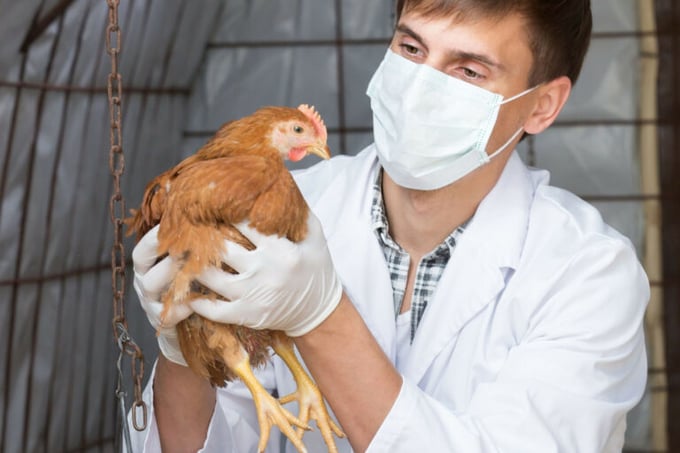November 24, 2025 | 21:59 GMT +7
November 24, 2025 | 21:59 GMT +7
Hotline: 0913.378.918
November 24, 2025 | 21:59 GMT +7
Hotline: 0913.378.918

Several poultry companies have noted that the issue of vaccine shortages is gradually becoming more pressing. Photo: Canva.
Russian poultry farmers are largely concerned over the narrowing flow of imported veterinary pharmaceuticals, the local branch of Forbes reported. Russia is self-sufficient in poultry vaccines by only 30%, the Agricultural Ministry estimated. By 2030, the Ministry expects this figure to grow to about 47%, though this will require substantial investments.
In total, 297 imported and 319 domestic veterinary vaccines are registered in Russia, of which 117 and 73, respectively, are used for poultry farming, estimated Eduard Mailyan, an independent poultry industry analyst. Out of the 50 most popular types of vaccines in poultry farming, local firms fully meet the industry’s demand only for 11, he said.
Russian veterinary pharmaceutical imports are in jeopardy, as from 1 September, a new procedure for getting a greenlight for imports from the Russian regulator is due to come into force.
“The new rules, in fact, obligated all foreign manufacturers of immunobiological products to undergo certification for compliance with Russian rules of good manufacturing practice, or GMP, and provide their vaccine strains for deposit in Russia,” Mailyan noted. “And for some, providing a strain is tantamount to disclosing a trade secret, since, after transferring the material, the vaccine can begin to be produced without the company’s involvement.”
Some of the world’s largest vaccine suppliers have left the Russian market under the sanction pressure. For example, Mailyan listed Intervet/MSD, Zoetis, Boehringer Ingelheim/Merial, Elanco/LAH/Avipro among those that pulled out from the country.
For those that remain on the market, sanctions have made imports more challenging. For example, Hipra and CevaSantéAnimale reportedly experience difficulties in importing vaccines, the analyst added.
There is already a shortage of effective vaccines, which could lead to a decrease in production effectiveness in the poultry sector, warned Mailyan. For example, poultry farms are beginning to experience a shortage of vaccines against Newcastle disease. This shortage could potentially lead to a rise in disease outbreaks, increased mortality rates, and a decline in poultry production, all of which would have a significant economic impact on the sector.
“The availability of imported vaccines has greatly decreased, and domestic suppliers, unfortunately, cannot keep up with the growing demand for their products due to limited production capacity,” te Cherkizovo press office commented.
Several poultry companies told Forbes that the issue of vaccine shortages is gradually becoming more pressing. To plug the gap, Russian poultry farmers import vaccines via parallel imports through third countries. However, in this case, the issue of vaccine safety comes to the fore, as grey schemes are less reliable than official channels, Forbes reported.
(Poultryworld)

(VAN) Brazil's COP30 presidency pushed through a compromise climate deal on Saturday that would boost finance for poor nations coping with global warming but that omitted any mention of the fossil fuels driving it.

(VAN) Poultry farmers in the UK have been warned that they could face one of the worst winters yet for bird flu.

(VAN) Prices of main-crop paddy have risen sharply, with jasmine rice hitting 16,100 baht per tonne — the highest level in years.

(VAN) In Brazil, FAO unveiled a series of reports and initiatives showing how sustainable agrifood systems are a solution to the climate crisis.

(VAN) With names like neodymium and dysprosium, rare-earth elements sound exotic — and their perceived scarcity has only added to the mystique.

(VAN) In a new study published in Trends in Biotechnology, researchers used a gene-editing technology called CRISPR to increase a fungus's production efficiency and cut its production-related environmental impact by as much as 61%- all without adding any foreign DNA.

(VAN) A top official in Beijing’s Cop delegation says China is committed to clean energy – but US’s absence is a problem.